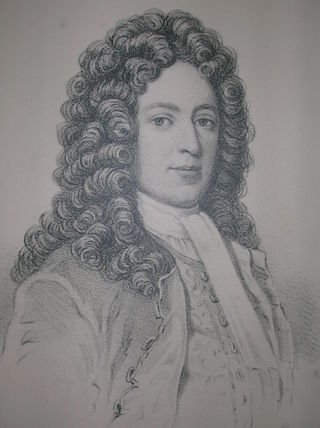Related Research Articles

Marquess of the County of Bute, shortened in general usage to Marquess of Bute, is a title in the Peerage of Great Britain. It was created in 1796 for John Stuart, 4th Earl of Bute.

Earl of Dumfries is a title in the Peerage of Scotland. It was originally created for William Crichton, 9th Lord Crichton of Sanquhar, in 1633, and stayed in the Crichton family until the death of the fourth countess in 1742, at which point the title passed to first the Dalrymple and then the McDouall families before finally being inherited by the Marquesses of Bute, where it remains today.

Earl of Stair is a title in the Peerage of Scotland. It was created in 1703 for the lawyer and statesman John Dalrymple, 2nd Viscount of Stair.

Earl of Glencairn was a title in the Peerage of Scotland. It was created in 1488 for Alexander Cunningham, 1st Lord Kilmaurs. The name was taken from the parish of Glencairn in Dumfriesshire so named for the Cairn Waters which run through it.

John Douglas, 2nd Earl of Morton died 9 September 1513 at the Battle of Flodden.

Robert Kerr, 1st Marquess of Lothian, known as the 4th Earl of Lothian from 1675 to 1701, was a Scottish nobleman. He was styled Lord Kerr until 1661 and Lord Newbattle from 1661 to 1675.

Alexander Seton Montgomerie, 9th Earl of Eglinton was a Scottish peer.
Patrick McDouall-Crichton, 6th Earl of Dumfries was a Scottish peer.
Viscount Carlingford, in the County of Louth, was a title that was created twice in the Peerage of Ireland. The first creation came in 1627 in favour of Edward Barnham Swift. He was the son of Sir Robert Swift, High Sheriff of Yorkshire from 1599 to 1600 and his wife Ursula Barnham. Lord Carlingford had no sons and the title became extinct on his early death in 1634. By his wife Lady Mary Crichton, daughter of William, 1st Earl of Dumfries, he had one daughter Mary, who married the notorious rake Robert Fielding, but had no children.

Clan Crichton is a Lowland that historically ruled Dumfries. Scottish clan.
William Crichton, 1st Lord Crichton was an important political figure in the late medieval Kingdom of Scotland.

Clan Stuart of Bute is a Highland Scottish Clan and is a branch of the larger Clan Stewart.
William Crichton-Dalrymple, 5th Earl of Dumfries, 4th Earl of Stair, KT was a Scottish peer. He inherited the title of Earl of Dumfries in 1742, upon the death of his mother Penelope Crichton, 4th Countess of Dumfries. He also held the heritable position of the Sheriff of Clackmannan from 1742 until heritable sheriffdoms were abolished in 1747.
Margaret Stewart was the younger daughter of James II of Scotland and Mary of Guelders. Once engaged to the Lancastrian Prince of Wales, Margaret instead became the mistress of William Crichton, 3rd Lord Crichton, and the mother of his illegitimate daughter, Margaret Crichton, later Countess of Rothes, and possibly his son, Sir James Crichton, progenitor of the Viscounts of Frendraught. Margaret and Lord Crichton may have been married later, after the death of Crichton's wife.
John Maxwell, 4th Lord Maxwell was a Scottish nobleman and patriarch of the Border Family / House / Clan of Maxwell.

Sir John Stonhouse, 3rd Baronet, PC (c.1672–1733) was an English landowner and Tory politician who sat in the English and then British House of Commons from 1701 to 1733.

The site of the old Lefnoreis Castle or Ward of Lochnorris lies about 100 yards north-west of the old stable block of Dumfries House in East Ayrshire, Parish of Old Cumnock, Scotland. The old castle stood on a natural rise overlooking the Lugar Water, built and held for many years by the Craufurd family. For consistency the spelling Craufurd will be used throughout and Lefnoreis for the castle.
William Crichton, 1st Earl of Dumfries the ninth Lord Crichton, was born to William Crichton and Katherine Carmichael.
Arthur Henry Johnstone-Douglas JP DL was a Scottish soldier and politician.
Lord Basil Hamilton was a Scottish aristocrat who drowned trying to save his servant.
References
- 1 2 3 4 5 6 7 8 9 10 11 12 13 14 15 Sir James Balfour Paul, ed. (1906). The Scots Peerage Founded on Wood's Edition of Sir Robert Douglas's Peerage of Scotland.
- 1 2 3 Cokayne, George Edward, ed. (1890). "Dumfries". The Complete Peerage of England, Scotland, Ireland, Great Britain, and the United Kingdom Extant, Extinct, or Dormant. The Complete Peerage. Vol. III. London: George Bell & Sons. p. 194.

- ↑ "Dumfries, Earl of (S, 1633)". www.cracroftspeerage.co.uk.
- 1 2 Rev John Warrick (1899). The History of Old Cumnock.
- ↑ "Parish of Old Cumnock: Civil History: Eminent Men". The New Statistical Account of Scotland. Statistical Accounts of Scotland. Vol. V. Edinburgh: William Blackwood and Sons. 1845. pp. 480–482.
